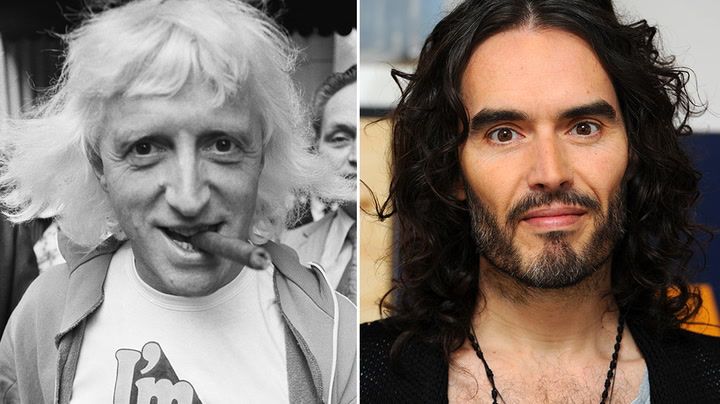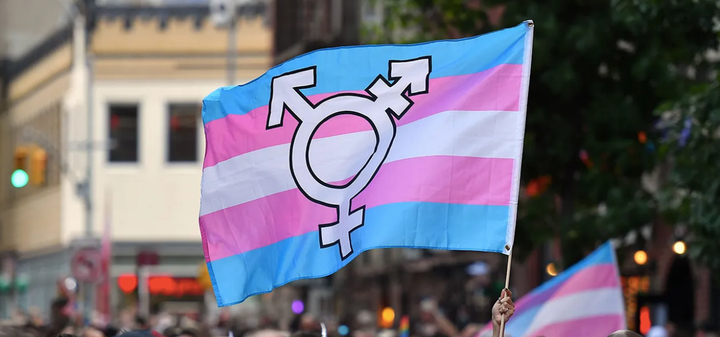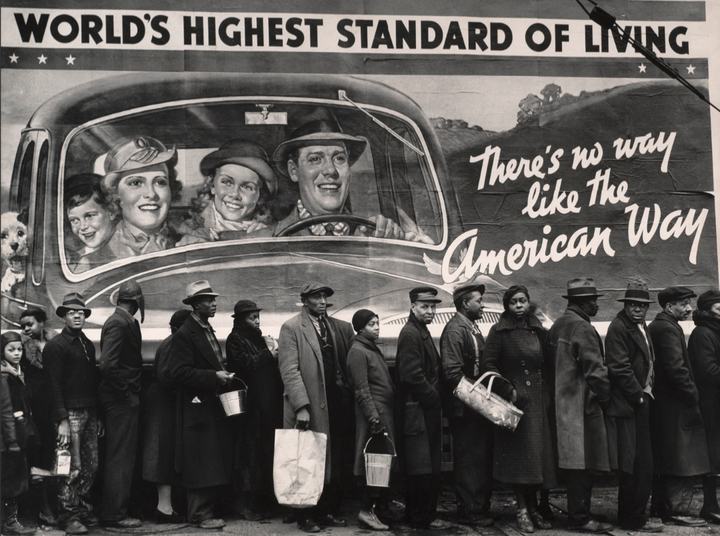The feigned disgust of the British cultural ecosystem in response to the allegations against Brand is not only unconvincing; it also serves to mask a much more extensive state of exploitation and decay.
Who was genuinely surprised when, waking up one day last week, we read that allegations of sexual abuse and rape were surfacing against Russell Brand ? One accuser claims that his behaviour, especially towards younger women, was already a well-known 'secret' inside the culture industry . Surely, they were not as surprised as they make themselves out to be in the documentary on the subject and in other pieces that they have scrambled to write to expiate themselves. However, what about the rest of the public? How did we all react when it was alleged that another celebrity, far removed from our daily existence, living a life that was basically inscrutable, untouchable, and actively encouraged, had abused his power to prey upon women?
The first reaction is rightly one of rage, disgust, and unequivocal support for the survivors. Upon hearing the news, most people attempt to affirm that something like this should never happen again. However, the culture industry's goals are different: they will try to evade responsibility and paint Russell Brand as the 'black sheep' of an otherwise sound environment; an aberration that incomprehensibly got away with murder, but one which, supposedly, will be used to prevent any repetition of similar abuses.
We must think differently. After our first reaction, there should be second, and a third. We must soberly scrutinise the wider systems that make these behaviours possible. And we must ask some uncomfortable questions about how, through our consumption and our acceptance, we allow these abusers to do whatever they want. There will be more Russell Brands. As these lines are written, they are probably enjoying themselves in some villa. Our surprise and outrage, when focused on any one individual that happens to be in the news, allows every other element of this wider system to keep on functioning. This system of complicity is founded on at least three interrelated layers, or, as we will call them in this article, 'cesspits'. Let's dive in.
Cesspit #1: The mainstream culture industry
How much can you promote idiocy, meaninglessness, narcissism, and senseless wealth before the logical conclusions of this concoction actually make themselves felt? To what extent can you build an entire multibillion-pound industry based on inhumanity while also protecting the vulnerable humans that are part of it? The whole Weinstein debacle and the associated MeToo movement that sprung out of it were evidently not powerful enough, by themselves, to make some fundamental connections widely visible.
The first cesspit concerns the culture industry, and particularly its mainstream aspect. It is the first layer that one must look upon to understand why there will be many more Brands after this one.
Anyone who has worked even half a shift in a film, series, documentary, music event, or any type of significant production has probably noticed the omnipresence of narcissists in these environments. This applies to almost everyone in the industry's food chain, but the few big names that bring in the big bucks are basically given a green light to behave as they want. They are free to have their temper tantrums in front of hundreds of coworkers; they are free to ask for whatever they want, and most wishes are granted; and, of course, their symbolic distance from the rest of the workforce is mirrored by their physical inaccessibility, as in many cases their quarters are off limits (a pretty basic but also important detail in cases such as Brand's).
Productions cannot risk disappointing these individuals because their entire existence on set is underpinned by the constant, veiled threat that they will leave, or threaten to leave, at their slightest inconvenience. They have the power to do that, because where they go, the consumers go. Where the consumers go, the money goes, and the production's revenues from advertising plummet. As most people have already guessed, the industry does not exist to produce enlightening, empowering, or substantially entertaining works of art; the issue is money. Here, things are no different from the rest of our capitalist society: the privileged are allowed to manoeuvre as they please, until one of them gets publicly exposed. Then, they will hold a ceremonial burning at the stake against one individual, and everything proceeds as normal.
These circumstances have been tacitly accepted for years, and many people on set know about them. They know who the problematic individuals are, and they know what they do. They keep silent because their jobs, and their entire sector, has been designed to depend on the revenue that these figures bring in. Victims are silenced, gaslighted, or simply ignored. The tears and proclamations of astonishment coming from the higher-ups of the industry should surprise no one, unless what is surprising is the degree of hypocrisy that they entail. However, Cesspit #1 only scratches the very dirty, but nevertheless obvious, surface. It gets deeper.
Cesspit #2: The celebrity system
This layer expands beyond the realm of mainstream music, movies, series, and similar productions to include the realm of politics, sports, literature, and even the sciences. Simply put, we live in a society that gifts loads of money, support, adoration, and resources to individuals based on what we believe them to be; even worse, this belief is usually based on a very small portion of someone's total personality. We don't know these people. And yet, we give them a power that we don't, and cannot, even offer to our loved ones.
Of course, there is an entire structure behind these faces, using their celebrity status to make more money than even they do: there is a Nike behind LeBron James, the same way that there is an MIT, and various publishers, behind our beloved Noam Chomsky .
This entire system, which one French theorist, Guy Debord, called 'The Society of the Spectacle', is premised on making money from our desires to consume. To do this, it must train us, harness our instincts, weaken our attention spans, and direct our taste towards specific products. It must create consumers. Consumption and our desires are not neutral; they are actively impacted by what we see, what we hear, and what we unconsciously accept from our surroundings and our everyday lives. At some point, Debord argued, the image, the unreal, the phantom, becomes more real, more powerful, than our means to control it.
The culture of celebrities is one of the most direct ways that the spectacle controls us: it produces characters that inspire us, that we look up to; these characters become fused with how we conceive our identities, they become part of the reasons that we do what we do. And, of course, the Nike behind the LeBron profits from us. Celebrities are nothing but products that are promoting other products. We are the consumers.
Much has been written about this industry, and this is not the space to repeat it. I will bring the focus back to the issue of Russell Brand: what is Brand selling? During his days as a presenter and actor, he was selling a specific cultural product (whether it was a series or a movie), alongside the advertising that was associated with it. When he became a writer, he was supporting his publishers. And now, in his current role as an eerie mix between a wellness guru and a protofascist charlatan , he is selling his own brand, alongside creating profits for the platforms that host him (such as YouTube). Are these contributions significant enough to warrant his millions? Most people would agree that probably not. But we are the ones paying for them. This money, magically, is money produced from our attention spans.
Whether it is Russell Brand – the alleged rapist, the panderer to the far-right – or Angela Davis, the widely respected Black feminist activist and philosopher (who I have used so many times as a reference in my own work), the core issue is not about whether we like or support a specific personality. When it comes to instances of abuse of power, the issue is that we have created a society that actively places specific people above the rest of us, and away from the rest of us. This distance means safety; whether behind the closed doors of a set protected by dedicated security guards and personal assistants or in some island resort (think Epstein), we have given these people the right to act without scrutiny. If your next-door neighbour beats up his wife, you will probably notice. But it takes an entire documentary, a massive media circus, and multiple very brave women risking themselves to expose Brand's multiple abuses – and this, many years after the alleged events took place.
Again, why are we so surprised?
Cesspit #3: The creation of powerlessness
The same way that products need consumers, abusers need people to abuse. The flipside of the unearned power that is exploited by the Brands of this world is the cultivated powerlessness of the majority of the youth that ceaselessly consume these cultural products. Of course, it is not just the youth that consume them; however, the youth are the most vulnerable (and, as history shows, the preferred population that these individuals prey upon).
When some situations are allowed to proceed for a long period of time, they become commonly accepted. Lunacy becomes the new normality, and paranoia the new rationality. We are cultivating a society where institutions of public knowledge and empowerment such as libraries are constantly closing or underfunded, where schools are simply training grounds for the new working and professional classes, where universities are becoming increasingly inaccessible, where the best one can realistically hope for in adulthood is being able to make the rent, and where social movements have almost disappeared entirely from the daily lives of communities.
These conditions breed many unmet needs and associated insecurities. They are filled by endless, mindless content from social media and the cultural industry, always hungry to create new consumers. Developing and exploiting people's insecurities is one of the most guaranteed ways to turn profits: you can never be too fit, too sexy, too accomplished, or too charming. The youth find themselves caught in a meaningless society with no obvious light at the end of the tunnel; in contrast to previous generations, they are deprived of the cultural means to empower themselves. Is it surprising that some of them are likely to idolise, even fanatically, a figure which an entire cultural industry promotes as being the epitome of freedom, carelessness, and power?
We are dealing with an entire industry that literally grooms children and young adults to worship these figures, while at the same time giving these figures the power and space to do whatever they want.
However, if we believe the allegations [trying very hard not to get sued here], there was a wider network of culpability that allowed Brand to operate with power over women. The entire media system did more than simply passively allowing Brand freedom of movement: it nurtured the entire environment that made everything possible. The core point is that Brand's sexual desires were open and widely tolerated. They were encouraged by those around him. The way in which he was chatting with Jimmy Saville on a public broadcast betrayed the comfort that both of them felt in abusing and demeaning women. They were untouchable, and they knew it. Even worse, their untouchability was celebrated: Brand's entire selling point was centred around his crass, hypersexual, borderline predatory personality. And young people were told that not only was there nothing wrong, but that this is something to aspire to.
When we have supported, consumed, and reproduced an entire cultural system premised on inequality, power, and abuse of authority, these results should not surprise anyone. We should be indignant: the issue is what we do with this indignation.
Towards the creation of alternative cultures
Beyond seeking justice for victims (which will be the subject of a forthcoming article), we must work towards building a cultural system that is actively opposed to these cesspits. Obviously, the solution is not to do away with culture altogether, or to revert back to some sort of puritanic sexual piety. We want strong, inspiring, and entertaining forms of culture, and we want sexuality to be fully liberated.
It is important to recognise that the cesspits that breed Brands extend far beyond any individual Brand. This is the first step, not just towards trying to prevent abuses from reoccurring, but also towards targeting the wider systems that create forms of culture which function against us instead of for us. The few social movements, autonomous spaces, and radical cultural initiatives that survive in Europe have taken important steps in essentially reversing the three cesspits.
Where the dominant culture relies on unequal working relations that elevate a few personalities above the rest, we can create alternative structures that rest on collaboration and mutuality. This has already been put into practice through a range of initiatives (for example, in cinema and in festivals), across the world. Where the dominant culture relies on celebrities and headliners, we can appreciate and encourage the different capacities that everyone brings to the table; after all, every Brand needs someone behind the camera. For example, the DIY collective Ypoga K94 in Athens has set up hundreds of gigs without headline acts, and with every member of the collective working equitably in every project. They also refuse to make their initiatives about profit, instead relying on voluntary donations that aim to keep their social space running.
Such initiatives, by their very nature, develop equitable power structures, which do not allow for the creation of untouchable personalities that can indefinitely abuse their power. They actively aim towards developing empowered, autonomous individuals. They stand against everything that the dominant culture promotes. The closeness that characterises them and the recognition of everyone's interdependence are checks against any one individual assuming disproportional authority over the rest. Moreover, they support accountability and personal responsibility. Potential abusers may be everywhere; however, there are ways to make them feel less enabled, and there are ways to actively support victims both in terms of speaking and in terms of surviving.
Our dominant cultural industry does none of that. It will chastise Russell Brand in order to keep the overarching structure of power untouched. We can, and should, create something better.
Crux Antimatter is a sociologist working somewhere in Mordor. Until he gets a permanent contract, he will continue using a pseudonym to write these types of articles.






Comments ()